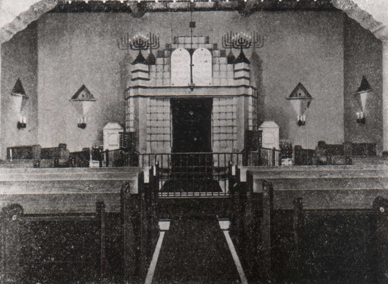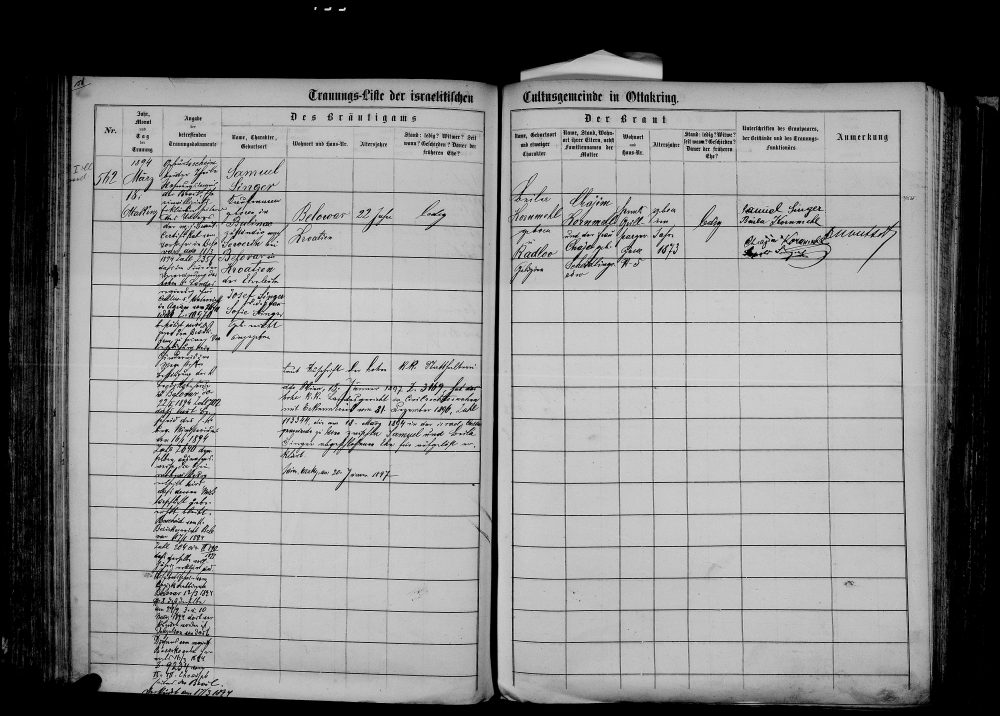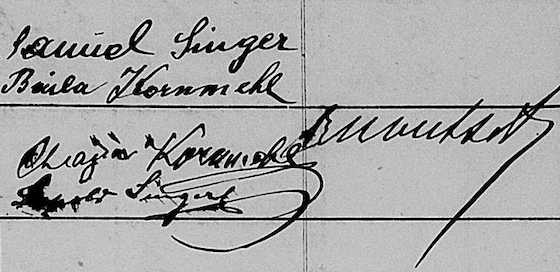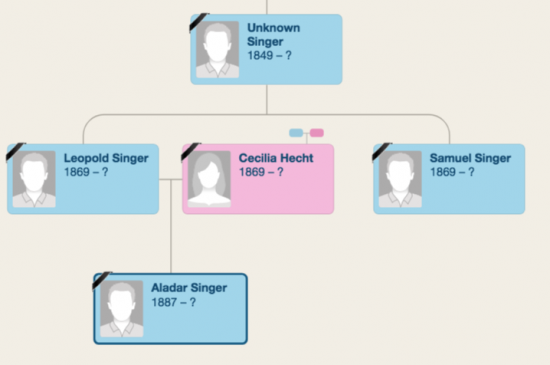
This is Day Five of the Family History Writing Challenge, 2018.
I mentioned in my first post of this challenge that I found a clue associated with trying to learn about Bertha Kornmehl and Adolf Schweizer: A listing for my great aunt in Geni.com that showed her with a hyphenated name, Bertha Singer-Schweizer.
That puzzle was very easily resolved, as it turned out. I noted the hyphenation in my request to the IKG for documents about Bertha Schweizer, and received in turn a document of Bertha’s marriage to Samuel Singer.
And, yes, Singer is a ridiculously common name.
The Marriage Document

I have had the scrolls of handwritten information transcribed into typed German–I’ll get to that.
Here’s what I first discerned from this document about Samuel Singer.
- He and Bertha were married in Vienna at the Ottakring synagogue on March 18, 1894; I’ve put a picture of that temple at the top of the page, next to the title.
- Samuel was 22 years old at the time of the marriage (I can’t find his date of birth on the document, but since it seems to indicate that he was 22, he must have been born around 1872).
- He was born in Belovar, Croatia
- His parents were named Josef and Sofie Singer (her maiden name is not specified–unfortunately).
- The witness to the marriage for the groom was Leopold Singer. I’m guessing he was a brother.
The information about the bride, Beila Kornmehl, that she was born in 1873 in Radlow (Poland), confirms information about her that I have from other sources.
Her witness for the wedding was her mother Chaya Kornmehl, born Scheidlinger.

This is my favorite part of the document, seeing my great-grandmother’s signature. She was born around 1844 so she would have been 50 for an 1894 wedding. I’m guessing that her blotchy chicken-scratch signature had more to do with a difficulty with writing than with infirmity.
On the other hand, Leopold Singer’s signature is even worse so maybe there was a problem with the fountain pen.
I don’t know what that scrawl in the far right column is. All guesses welcome.
Who is Samuel Singer?
I next looked on Geni and MyHeritage to find out more about the groom and came up with…not much. I found a Samuel Singer who was born in 1869 with a father named Josef and a mother named Cypra — but none of the sibling names matched and the birthplace was Ukraine, which is not close to Croatia.
On the other hand, I found the family tree, below, which has individuals living in Hungary, which has a Croatian population; it also has Leopold and Samuel as siblings, born around the right time (twins?):

Found in Translation
So, the promised typed transcript of the indecipherable third column scroll on the left hand page:
Geburtsscheine beider Theile Wohnungszeugnis der Braut, Eheeinwilligungs-Erklärung seitens des Vaters der m.j. Braut. Certifikat vom Vorsteher in Belovar ada 11/3 1894 Zahl 2351 dass im Sinne der Verordnung der hohen k. Landesregierung für Cultus- u. Unterrricht in Agram vom 26.11.1886 2.10970 bestätigt wird xxx dem Bräutigam zu seiner Verehelichung kein Hindernis im Wege stehe. Bestätigung der k. Bezirksbehörde in Belovar da 22/I/1894 Zahl 702 dass laut Bescheid des h.k. ung. Ministeriums vom 16/1 1894 Zahl 2640 demselben ausnahmsweise die Heiratbewilligung erteilt wird, dass dessen Militärpflicht unberührt bleibt. Bescheid vom k. Bezirksgericht Belovar 17/1 1894 Zahl 204 civ IV190/1823 dass derselbe volljährig erklärt wird. Aufgebotsschein vom Bezirksrabbiner Belovar 12/3 1894 Nr. 8 das derselbe am 29/2 3. u. 10 März 1894 dort verkündet worden ist. Delegation von dort xxx vom magist. Bezirksorte Hernals 16/3 1894 Z. 9234 vom II. III. Eheaufgb seitens der Braut. Verkündet am 17/3 1894.
I posted it on a Facebook group that focuses on Jews from German-speaking countries and was told that “there is a lot of very official language referencing various laws. It basically says that there is nothing hindering the groom from getting married and that he will still have to serve his military service and that the magistrate is allowing him to get married and that he is been declared an adult.”
I’m still waiting for someone to declare me an adult.
I also got feedback from the group about Belovar:
Using the statistics of the Republic of Croatia, Bosnian Wikipedia cites for the year 1910 in Belovar seven Jews; the other 236 were Roman Catholics. Maternal languages: Croatian (233), Czech (9) and one Hungarian-speaking.
That in turn led me to speculate that one of those Jews must have been Samuel’s brother, Leopold, whose son Aladar is noted as having been born in Kisapostag, Feder County, which is in Hungary.
But I’m not going to go down that geographical rabbit hole, tempting as it is.
D-I-V-O-R-C-E
Perhaps the most intriguing part of this document is its 20 Jan 1897 annotation.
Laut Zuschrift der hohen kk. Statthalterei Wien, 15. Jänner 1897 Z. 3169, hat das k.k. Landesgericht in Civilrechtssachen mit dem Erkenntnis vom 31. Dezember 1896, Zahl 113344, die am 18. März 1894 in der israel. Cultusgemeinde zu Wien zwischen Samuel und Beila Singer abgeschlossenen Ehe für aufgelöst erklärt. Wien, Ottakg, am 20. Jänner 1897
Another helpful source from the group came up with this translation:
According to a memo from the Imperial & Royal city government no. 3169 of Jan 15, 1897, the provincial court for civil matters, declared the marriage between Samuel & Beila Singer on 18 Mar 1894, concluded by the Jewish Community of Vienna, to be dissolved according to the findings of 31 Dec 1896. Vienna, Ottakring, 20 Jan 1897.
This is the big reveal–and leads to several questions.
How common was Jewish divorce in the 1890s — even in sophisticated cities like Vienna?
Why did Beila/Bertha and Samuel marry in the first place? Was he trying to avoid the draft (thus all the disclaimers about how he’s subject to serve anyway)? Did he discover that she couldn’t have children (I’ll get to that later)? Was he a ne’er-do-well who couldn’t get a job? Did Bertha hate Samuel’s lousy Croatian-German accent? Her MIA-from-the-wedding in-laws?
Was it because of their disapproval that Samuel had to be declared an adult by magistrates?
I doubt that the divorce records, which I will send for, will reveal answers to any of these questions but it’s fun to speculate.
Subject to be continued…

The smudging is common to me, a leftie! Those darn fountain pens always smear when we lefties have to use them since they are so wet. So perhaps Leopold was a leftie – it would have smeared his and the one above it!